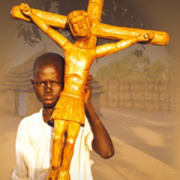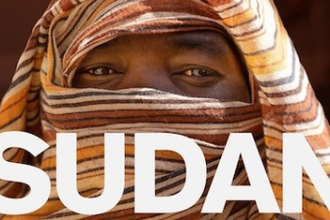Sudan conflict spreads to Christian areas

Sudanese boy with cross. Image ACN
After twelve weeks of fighting in the Sudanese capital, Khartoum, the conflict is spreading south, putting persecuted Christians there at risk. Violence has flared in South Kordofan and Blue Nile states, causing tens of thousands of non-Arabs and non-Muslims to flee to South Sudan and Ethiopia.
South Sudan's Catholic bishops are calling for urgent intervention. "We are deeply concerned about the regional and international components to the conflict [in Sudan]. The conflict is destabilising the region which is already fragile and weakened by internal conflicts," the bishops said in a statement addressed to the international community.
The NGO Open Doors estimates there are two million Christians in Sudan. As thousands of fundamentalist Islamists join the fighting, those Christian civilians are now in peril.
The Troika group of diplomats from the UK, USA and Norway have called on the warring parties to stop the conflict moving to Sudan's peripheries where non-Muslims and non-Arabs are vulnerable to ethnic cleansing. The UN Integrated Transition Assistance Mission (UNITAMS) has also expressed "grave concern" about the violence in Blue Nile state.
According to Lord Alton of Liverpool, "Notwithstanding the lamentable international failure to prevent one million deaths in the Rwandan genocide the world then looked away as southern Sudan and Darfur were subjected to comparable mass murder. Those responsible were never brought to justice, and in that culture of impunity Sudan is once again a killing field. If it has no intention of honouring the obligations in the Genocide Convention - to prevent, protect, and punish those responsible - Britain should withdraw its signature from the Convention. It would more honestly reflect the realities of international indifference."
On June 24th, fighting erupted in the Blue Nile state town of Kurmuk between the Sudanese Armed Forces (SAF) and the Sudan People's Liberation Army-North (SPLM-N) Al-Hilu faction, causing 35,000 people to flee, 3,000 of them going to neighbouring Ethiopia. The SPLM-N Al-Hilu faction has been in conflict with the Khartoum regime for years because the faction wants a secular state rather than one based on fundamentalist Muslim rule akin to Iran or Afghanistan.
Meanwhile, in South Kordofan state, the SAF is fighting the Rapid Support Forces (RSF), the former Janjaweed militias responsible for ethnic cleansing in Darfur. Christian Solidarity Worldwide reports that the RSF is forcibly converting local Christians to Islam in South Kordofan. It is thought that 200,000 people fled to South Kordofan to escape the carnage in Khartoum. They face RSF bandits on their journey, and plundering RSF groups in the towns. Local Nuba defenders are fighting both the army and the RSF, making this a three-way war.
A Nuba leader (who is anonymous for the safety of his family in Sudan) said, "What have we done wrong that the army and the Janjaweed intend to eliminate us? They want the oil, uranium and gold beneath our land, perhaps."
The Reuters news agency interviewed several members of the Sudanese armed forces who confirmed that 6,000 Islamists had joined the army before the outbreak of conflict on April 15th. The Islamists held sway during the thirty-year dictatorship of Field Marshall Omar Bashir who is indicted for genocide by the International Criminal Court. Bashir's regime offered sanctuary to Osama bin Laden, the Muslim Brotherhood and other extremist Muslim groups.
Bashir and his Islamist supporters vowed to "change the demography" of Sudan by eliminating the non-Muslims and non-Arab ethnic groups. Their three-decade-long campaign led to the deaths of an estimated two million people and the secession of the new nation of South Sudan. Twenty years ago, it caused an estimated 500,000 deaths in Darfur at the hands of the Sudanese armed forces and their proxies, the Janjaweed.
Islamists subscribe to a narrow interpretation of Islam that rejects a legal or government system based on the laws and institutions of humankind. They reject democracy, civil society, pluralism, tolerance and accountability to the population. Under the influence of Sudan's powerful Islamists, churches have been confiscated and destroyed, and religious have been arrested, persecuted and in some cases killed.
According to an Islamist fighting with the Sudanese Armed Forces, posting on social media, "We are fighting and supporting the army to protect our country from external intervention and to keep our identity and religion."
A brigadier serving in the Sudanese armed forces medical corps posted on social media, "We will finish the RSF in Khartoum and then we will go after them in Darfur and then we will go to the Nuba Mountains and not only will we crush Al Hilu but his people as well because they are not Muslims."
On June 26th, the UK's Africa Minister, Andrew Mitchell MP, told the All-Party Parliamentary Group on Sudan that the government was working with its international partners to consider all options to stop the violence. The meeting heard from Sudanese survivors who described the RSF's systematic campaign of ethnic cleansing against the non-Arab inhabitants of Darfur as "worse than during the Darfur genocide" of 2003-2005. The Sudanese speakers said the violence would not stop until the financial interests of the Sudanese armed forces and the RSF were sanctioned by the Saudi Arabian and United Arab Emirates where the commercial entities are registered.
Rebecca Tinsley is the founder of www.WagingPeace.info


















